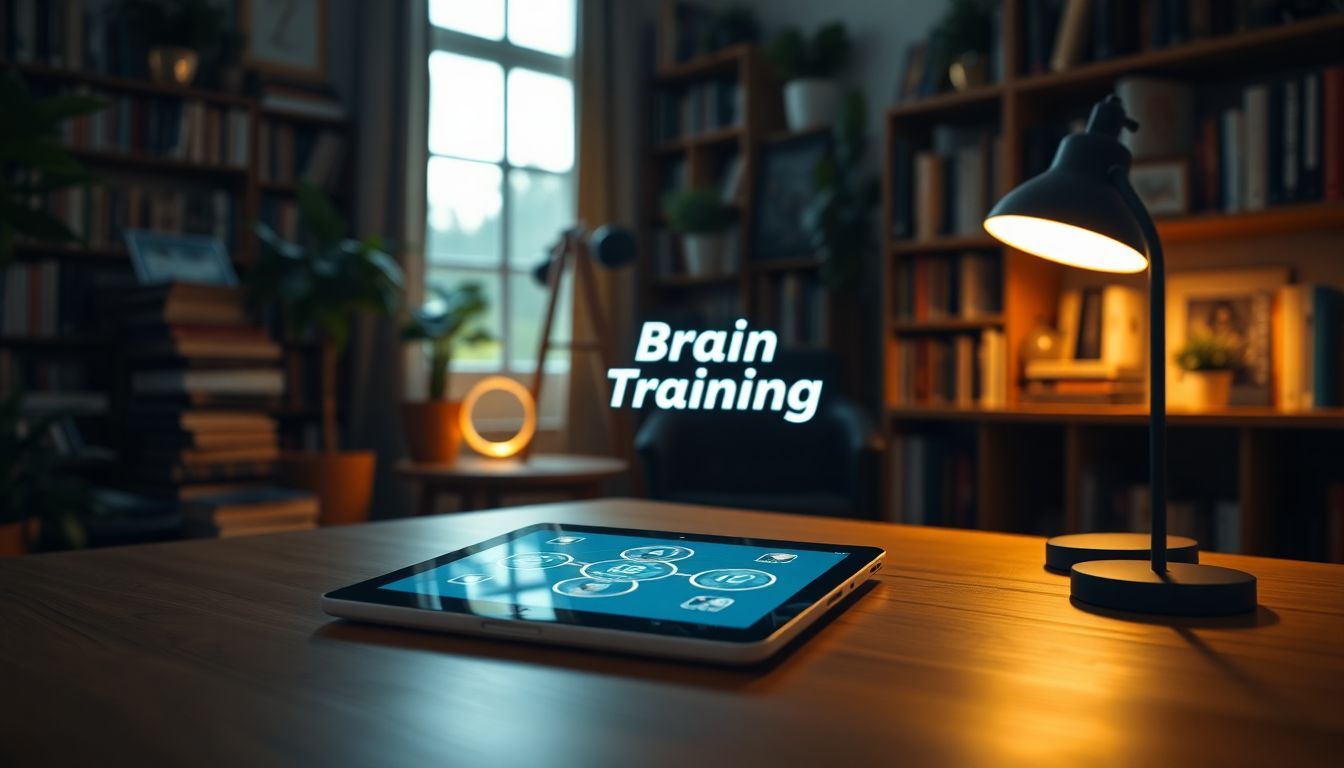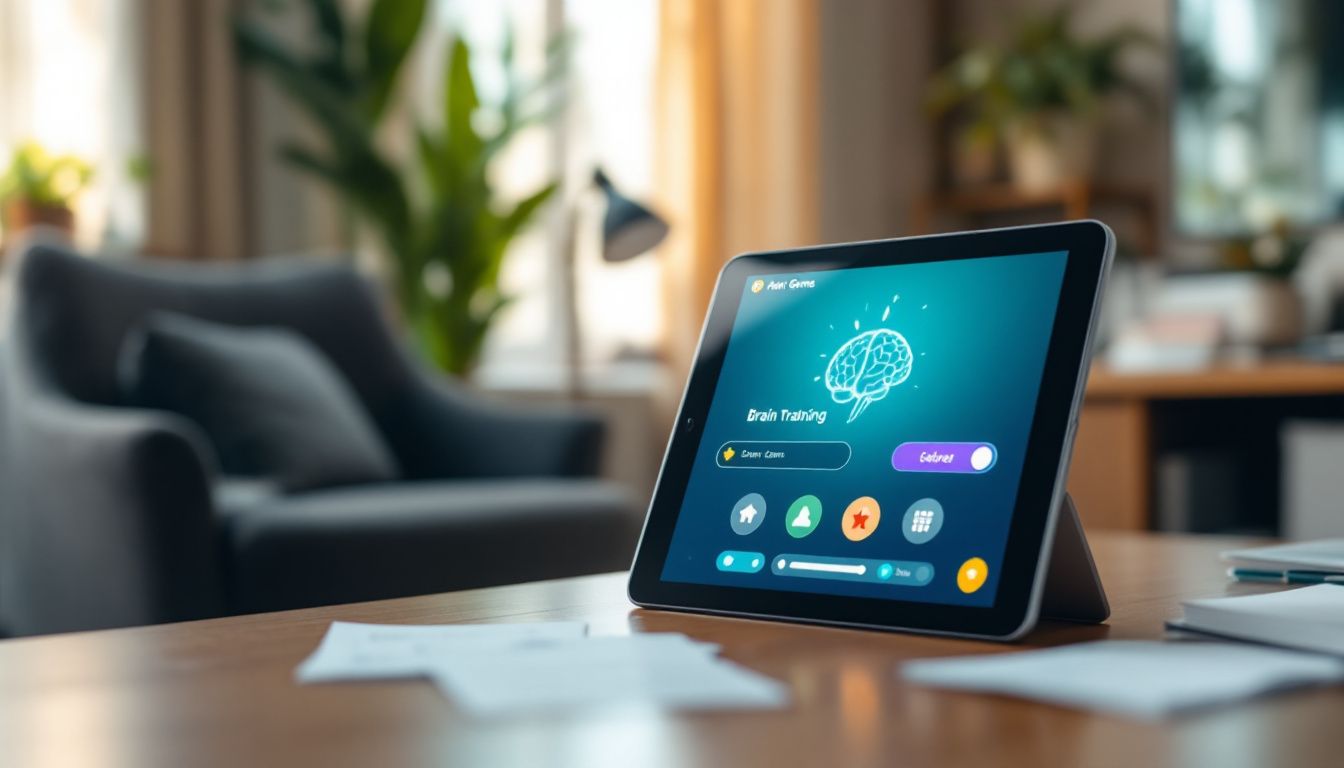Do you ever feel like your brain needs a workout? Digital brain training exercises can sharpen memory, boost attention, and improve problem-solving skills. This blog will show how these tools can help strengthen your mind for everyday tasks and long-term health.
Thank you for reading this post, don't forget to subscribe!Keep reading to learn more!
Key Takeaways
- Digital brain training exercises improve memory, focus, and problem-solving. Apps like Lumosity and Peak provide fun, targeted games for mental growth.
- Regular use of these exercises boosts cognitive skills like reaction time and logical reasoning while protecting against cognitive decline in aging adults.
- Studies in journals such as Psychological Science show consistent practice improves mental sharpness and lowers the risk of dementia or Alzheimer’s disease.
- Combining brain training with healthy habits like balanced nutrition, exercise, and social interaction enhances long-term brain health.
- Popular apps like Lumosity have over 100 million downloads globally. These tools make daily brain workouts accessible on phones or tablets.
What are Digital Brain Training Exercises?
 Digital brain training exercises are mental activities that sharpen thinking skills. They focus on improving areas like memory, attention, and problem-solving through fun challenges or tasks.
Digital brain training exercises are mental activities that sharpen thinking skills. They focus on improving areas like memory, attention, and problem-solving through fun challenges or tasks.
Designed to enhance cognitive abilities
These brain training exercises aim to sharpen cognitive skills like memory, attention, and problem-solving. They target areas such as working memory, reaction time, and processing speed with focused tasks.
Researchers from journals like *Psychological Science* highlight improvements in mental agility through consistent practice.
Apps often include memory games or puzzles that stimulate pattern recognition and logical reasoning. For example, solving jigsaw puzzles or playing math games can strengthen short-term memory while keeping the mind engaged.
Improve memory, attention, problem-solving skills, and mental agility
Digital brain training builds skills like memory and focus. Memory games, such as matching card pairs or solving jigsaw puzzles, push your mind to recall details quickly. These exercises strengthen short-term memory and boost long-term retention over time.
Games that require problem-solving improve logical reasoning and decision-making. For example, puzzles requiring pattern recognition train the brain to see connections faster. Activities like math challenges also sharpen reaction times while improving overall mental agility.
Offered through various platforms and apps
Brain training apps like Lumosity, Peak, and Brain Age help improve cognitive abilities. They use fun games and puzzles to challenge your brain while keeping you motivated. Platforms offer exercises for memory enhancement, logical reasoning, and problem solving.
These programs are easy to access on phones or tablets. Some target specific skills like processing speed or working memory, while others focus on overall mental health. Moving forward—let’s explore the benefits of these digital tools!
Benefits of Digital Brain Training
Digital brain training helps sharpen cognitive functions like memory and focus. It can also boost mental sharpness, helping you handle challenges more smoothly.
Improves performance in daily activities
Brain training exercises can sharpen focus and boost memory. These skills help with tasks like managing schedules, remembering details, or solving daily problems. Apps like Lumosity or Peak target working memory and processing speed—both crucial for quick decisions.
Regular mental exercise builds confidence in cognitive abilities. Many users report improvements in attention span and logical reasoning after consistent use. This makes multitasking easier and reduces stress during busy days.
Long-term benefits in brain health
Consistent use of brain training games supports long-term brain health. Studies show that regular mental stimulation slows cognitive decline and lowers the risks of dementia and Alzheimer’s disease.
It strengthens cognitive function over time, helping older adults maintain sharpness as they age.
Activities like memory games or exercises targeting working memory improve information processing speeds. This builds a cognitive reserve, which protects against mild cognitive impairment later in life.
Training the brain regularly creates lasting benefits for both younger individuals and older adults focused on healthy aging.
Improvements in specific cognitive domains
Brain training games can boost specific skills like memory, attention, and problem-solving. Studies in journals such as *Psychological Science* confirm these improvements. For example, tasks targeting short-term memory can enhance recall and focus over time.
Apps often challenge users with pattern recognition or math problems to strengthen logical reasoning.
Digital exercises also improve cognitive flexibility—the ability to adapt during task switching—and sustained attention. Regular practice sharpens executive functions, which involve planning and decision-making.
These benefits help in daily tasks and even protect against cognitive decline linked to aging or diseases like Alzheimer’s.
Increased confidence in cognitive skills
Progress in specific cognitive areas often leads to increased confidence. Digital brain training games adjust to skill levels, offering challenges that evolve as abilities improve.
This gradual improvement helps users feel assured about their mental sharpness and decision-making.
The captivating nature of memory games or logic puzzles keeps motivation high. People feel proud when they complete more difficult tasks over time. Such growth strengthens confidence in enhanced cognitive function, boosting positive psychology and overall mental health.
This sense of accomplishment can even carry over into daily activities like problem-solving at work or recalling small details in conversations.
Popular Brain Training Apps
There are many apps that offer fun and engaging brain exercises. They can help sharpen focus, boost memory, and improve thinking skills.
Examples: Lumosity, Peak, Brain Age
Lumosity, Peak, and Brain Age are popular brain training apps. Each offers games to improve cognitive abilities like memory, logical reasoning, and attention. Lumosity provides daily exercises customized to test mental agility.
Over 100 million people have downloaded it worldwide.
Peak emphasizes short-term memory and problem-solving through engaging challenges. It also tracks progress over time for clearer results. Brain Age became well-known for its math skills tests and memory games on the Nintendo DS.
These tools aim to enhance processing speed while keeping your mind sharp with consistent use.
Scientific backing for brain training
Studies in journals like “Psychological Science” show brain training improves specific cognitive skills. Activities enhance memory recall, attention span, and problem-solving abilities.
Research highlights consistent practice can boost long-term memory and mental sharpness over time.
Cognitive exercises also benefit older adults at risk for dementia or Alzheimer’s disease. Evidence suggests these activities slow cognitive decline and support brain health. Digital tools such as memory games or math skills apps target areas like sustained attention and logical reasoning effectively.
Incorporating Brain Training into Daily Routines
Fitting brain training into your day can be simple and fun. Quick activities like memory games or math challenges can keep your mind sharp while you go about your routine.
Creates a habit of continuous learning and cognitive enhancement
Digital brain training builds a habit of continuous learning. These exercises keep your mind active and ready to adapt. Tasks like memory games, pattern recognition, or math skills challenge you daily.
Over time, this improves cognitive flexibility and mental sharpness.
Regular practice enhances brain health while boosting working memory and logical reasoning. Apps such as Lumosity or Peak adjust difficulty levels as you improve—promoting growth at your pace.
Consistent engagement strengthens sustained attention and problem-solving abilities… leading right into multitasking benefits!
Targets multi-tasking and cognitive flexibility
Brain training games improve multi-tasking and cognitive flexibility by engaging multiple skills at once. Games like memory recall exercises or problem-solving challenges push the brain to switch tasks quickly.
This strengthens mental agility and helps handle different activities smoothly.
Users often notice better focus in daily tasks, as well as sharper decision-making abilities. Apps such as Lumosity use these techniques to enhance working memory and sustained attention.
With regular practice, individuals can train their minds to adapt faster—leading to increased confidence in tackling complex situations.
Complementing Brain Training with Other Activities
Pair brain exercises with other healthy habits to see better results. Small changes, like staying active or eating well, can also boost mental sharpness over time.
Maintaining a balanced lifestyle with proper nutrition and physical activity
Eating whole grains, fruits, and vegetables strengthens brain health. They provide the nutrients needed for better cognitive function. Healthy fats like those in nuts and fish improve memory recall and mental sharpness.
Avoiding processed foods benefits both your body and mind.
Physical exercise boosts blood flow to the brain. Activities like walking or yoga help reduce stress, which protects against cognitive decline and dementia over time. Staying active also improves problem-solving skills and enhances working memory…
making it easier to tackle daily tasks with confidence.
Social interactions are key too—continue reading on how these boost mental agility!
Benefits for older adults in maintaining cognitive health
Regular brain training can help older adults delay cognitive decline. Activities like memory games and problem-solving exercises improve short-term memory, logical reasoning, and pattern recognition.
Consistent mental stimulation strengthens brain function and promotes cognitive adaptability, keeping the mind sharp as it ages.
Studies show that cognitive exercises boost long-term memory and sustained attention. They may even reduce risks associated with Alzheimer’s disease or dementia. Brain training apps such as Lumosity or Peak provide easy access to engaging challenges designed for aging minds.
Small daily efforts lead to better overall brain health over time.
Enhancing cognitive abilities through social interactions
Talking with others boosts brain function. Social activities like group discussions or games improve memory and mental sharpness. Engaging in these interactions builds cognitive flexibility and problem-solving skills.
They also encourage logical reasoning by exposing you to new ideas.
Older adults benefit greatly from regular social engagement. It can help slow cognitive decline and reduce the risk of diseases like dementia or Alzheimer’s disease. Social connections contribute to better mental health, which supports overall brain health.
Conclusion
Digital brain training exercises can sharpen your mind and boost cognitive health. They improve skills like memory, attention, and logic through engaging games. Apps like Lumosity and Peak make it easy to train daily.
Pairing these with a healthy lifestyle strengthens their impact. Start small—your brain will thank you!
